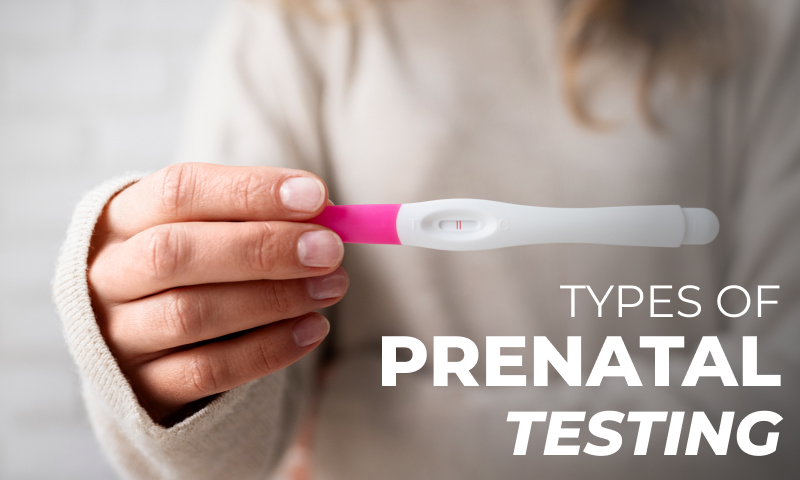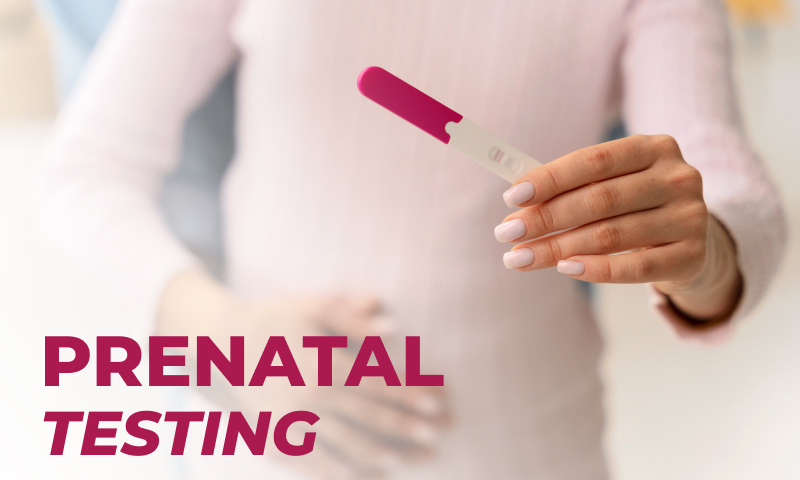Prenatal testing has revolutionized the landscape of pregnancy care, offering valuable insights into the health and well-being of both the expectant mother and the developing fetus. These tests aim to detect potential health risks and genetic abnormalities early in pregnancy, empowering parents and healthcare professionals to make informed decisions. In this comprehensive exploration, we delve into the types of prenatal testing, emphasizing the significance of genetic testing during pregnancy and evaluating its accuracy.
Introduction
Prenatal testing encompasses a diverse array of procedures designed to unravel the mysteries of the developing fetus, offering glimpses into its genetic makeup and overall health. This comprehensive exploration seeks to shed light on the types of prenatal testing, highlighting their significance in contemporary obstetric care, from non-invasive screenings that assess the risk of chromosomal abnormalities to invasive diagnostic tests that delve deeper into genetic intricacies. Each testing method uniquely contributes to the delicate balance of prenatal healthcare.
As we explore prenatal testing, we see that the information gathered from these tests helps identify potential health risks early on and gives parents the knowledge they need to make informed decisions. This encourages taking action to protect the health and well-being of the unborn child. This exploration will delve into the nuances of these testing methods. And unraveling the intricacies of their applications and assessing the strengthening landscape of accuracy and reliability in the realm of genetic insights during pregnancy. In doing so, we aim to provide a comprehensive understanding of the prenatal testing available, paving the way for a more informed and empowered approach to prenatal care.
Various types of Prenatal Testing during pregnancy
Prenatal testing encompasses a range of procedures designed to assess the health of both the mother and the fetus. These tests serve various purposes, including detecting genetic disorders, identifying potential congenital disabilities, and monitoring the overall well-being of the pregnancy. We can classify prenatal testing into two major categories: screening tests and diagnostic tests.
Screening Tests
First-Trimester Screening
Conducted between the 11th and 14th weeks of pregnancy, this screening combines a blood test and an ultrasound to assess the risk of chromosomal abnormalities, such as Down syndrome.
Maternal Serum Alpha-Fetoprotein (MSAFP) Test
Performed between the 15th and 20th weeks, this blood test measures the levels of alpha-fetoprotein to identify neural tube defects and chromosomal abnormalities.
Quadruple Screen
Conducted around the 16th to 18th weeks, this blood test assesses the levels of four substances to identify the risk of Down syndrome, neural tube defects, and other chromosomal abnormalities.
Non-Invasive Prenatal Testing (NIPT)
An innovative screening method that analyzes cell-free fetal DNA in the mother’s blood to detect chromosomal abnormalities with high accuracy, Down syndrome, Edwards syndrome, and Patau syndrome.

Diagnostic Tests
Chorionic Villus Sampling (CVS)
Conducted between the 10th and 13th weeks, CVS involves the extraction of a small sample of placental tissue to diagnose chromosomal abnormalities and genetic disorders.
Amniocentesis
Performed around the 15th to 20th weeks, amniocentesis involves collecting a sample of amniotic fluid to detect chromosomal abnormalities and neural tube defects.
Percutaneous Umbilical Blood Sampling (PUBS)
An invasive procedure performed later in pregnancy (after 20 weeks) to sample fetal blood from the umbilical cord, allowing for the diagnosis of various genetic conditions.
Prenatal Genetic Testing Types
Genetic testing during pregnancy plays a pivotal role in identifying specific genetic disorders and gaining a deeper understanding of the genetic makeup of the fetus. These tests provide crucial information that can guide decisions related to the pregnancy and the health of the unborn child.
Carrier Screening
Conducted before or during pregnancy, carrier screening assesses the parents’ risk of passing on genetic disorders to their child. This testing is relevant for couples with a family history of genetic conditions.
Single-Gene Tests
They designed targeted tests to identify specific genetic mutations associated with particular disorders, such as cystic fibrosis or sickle cell anemia.
Whole Exome Sequencing (WES) & Whole Genome Sequencing (WGS)
Innovative technologies that analyze the entire genome or the protein-coding regions provide a comprehensive view of the genetic makeup and identify potential risks.
Expanded Carrier Screening
A more extensive form of carrier screening that evaluates a broad range of genetic conditions, offering a comprehensive assessment of potential risks.
How Accurate is Genetic Testing during Pregnancy?
The accuracy of genetic testing during pregnancy varies based on the type of test performed. Non-invasive prenatal testing (NIPT), for example, has shown high accuracy in detecting common chromosomal abnormalities, with sensitivity and specificity exceeding 99%. However, it is essential to recognize that while these tests are reliable, they are not diagnostic and may yield false positives or false negatives.
Chorionic villus sampling (CVS) and amniocentesis are invasive diagnostic tests that doctors consider accurate for detecting chromosomal abnormalities. However, they carry a higher risk of complications, including miscarriage. The accuracy of these tests is crucial for making informed decisions about the continuation of the pregnancy and preparing for the potential challenges associated with a genetic condition.
It is imperative for individuals undergoing genetic testing during pregnancy to receive comprehensive counselling from healthcare professionals. This counselling should include a discussion of the benefits and limitations of each test, the potential for false results, and the implications of positive findings.
Conclusion
Prenatal testing has transformed the landscape of pregnancy care, offering invaluable insights into the health of both the expectant mother and the developing fetus, from screening tests that assess the risk of chromosomal abnormalities to diagnostic tests that provide a definitive diagnosis. The array of available testing options empowers parents to make informed decisions about their pregnancy journey.
As technology continues to advance, the accuracy and accessibility of prenatal genetic testing are likely to improve, providing even more comprehensive information about the genetic health of the fetus. However, it is crucial to approach these tests with a nuanced understanding of their capabilities and limitations. And they are recognizing the importance of counseling and support for expectant parents as they navigate the complexities of genetic information.
In the strengthening landscape of prenatal care, the goal remains the same: ensuring the health and well-being of both the mother and the child. These types of Prenatal Testing, when approached, serve as a powerful tool in achieving this objective. Offering a glimpse into the genetic blueprint that shapes the beginning of a new life.
A Like Blog: How To Control Vomiting In Pregnancy
FAQs
How accurate is genetic testing during pregnancy?
Non-invasive tests like NIPT are accurate, exceeding 99% sensitivity and specificity for common chromosomal abnormalities.
What is carrier screening?
Carrier screening assesses parents’ risk of passing on genetic disorders to their children, which is especially relevant for couples with a family history of genetic conditions.
What do diagnostic tests like CVS and amniocentesis do?
Diagnostic tests confirm or rule out specific genetic conditions and chromosomal abnormalities identified in screening tests, providing more detailed information.
How do WGS and WES differ?
Whole Genome Sequencing (WGS) analyzes the entire genome, while Whole Exome Sequencing (WES) focuses on protein-coding regions, aiding in the identification of potential risks.
